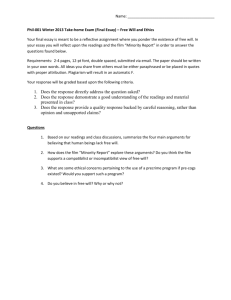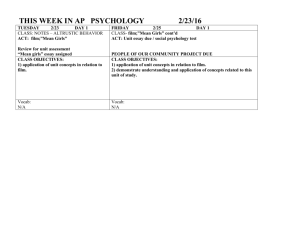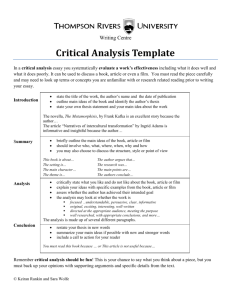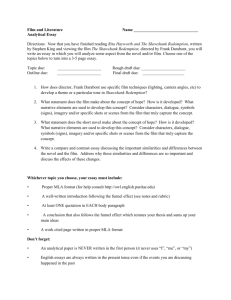KSU Web Home - Kennesaw State University
advertisement
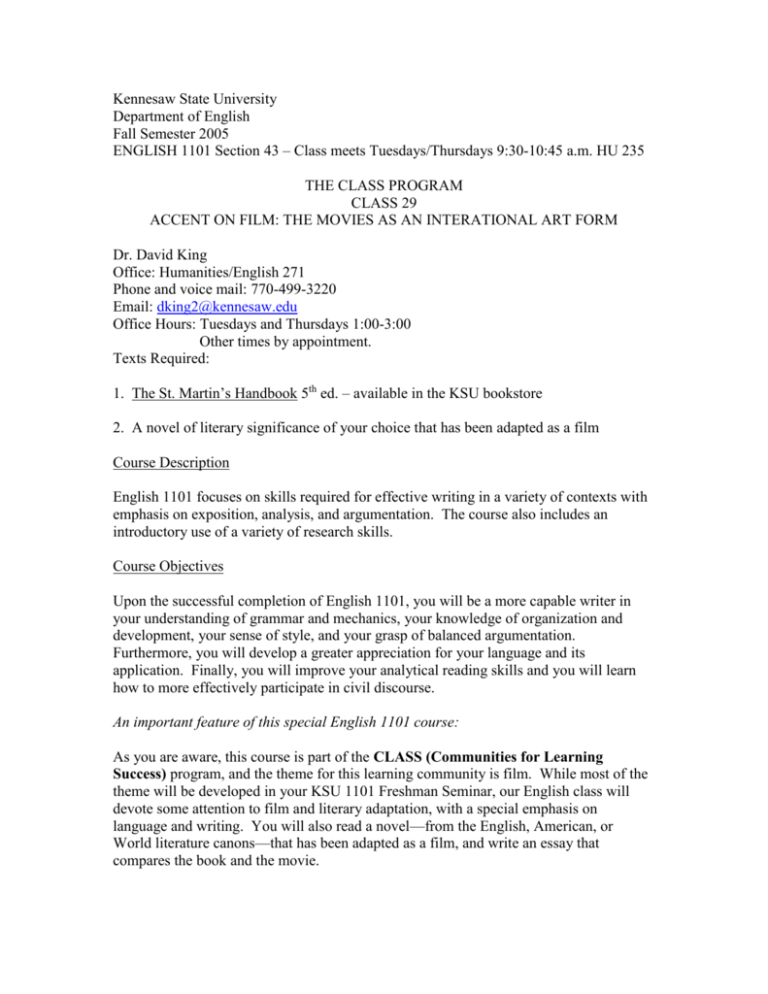
Kennesaw State University Department of English Fall Semester 2005 ENGLISH 1101 Section 43 – Class meets Tuesdays/Thursdays 9:30-10:45 a.m. HU 235 THE CLASS PROGRAM CLASS 29 ACCENT ON FILM: THE MOVIES AS AN INTERATIONAL ART FORM Dr. David King Office: Humanities/English 271 Phone and voice mail: 770-499-3220 Email: dking2@kennesaw.edu Office Hours: Tuesdays and Thursdays 1:00-3:00 Other times by appointment. Texts Required: 1. The St. Martin’s Handbook 5th ed. – available in the KSU bookstore 2. A novel of literary significance of your choice that has been adapted as a film Course Description English 1101 focuses on skills required for effective writing in a variety of contexts with emphasis on exposition, analysis, and argumentation. The course also includes an introductory use of a variety of research skills. Course Objectives Upon the successful completion of English 1101, you will be a more capable writer in your understanding of grammar and mechanics, your knowledge of organization and development, your sense of style, and your grasp of balanced argumentation. Furthermore, you will develop a greater appreciation for your language and its application. Finally, you will improve your analytical reading skills and you will learn how to more effectively participate in civil discourse. An important feature of this special English 1101 course: As you are aware, this course is part of the CLASS (Communities for Learning Success) program, and the theme for this learning community is film. While most of the theme will be developed in your KSU 1101 Freshman Seminar, our English class will devote some attention to film and literary adaptation, with a special emphasis on language and writing. You will also read a novel—from the English, American, or World literature canons—that has been adapted as a film, and write an essay that compares the book and the movie. GENERAL COURSE REQUIREMENTS Class Participation: Includes good attendance, participation in class discussions, and timely completion of reading and viewing assignments – 15% Essays: Includes four essays, two of which must incorporate documented secondary sources and demonstrate familiarity with both library and online basic research skills – 60% Quizzes, In-Class Writing, and Final Exam: Includes occasional quizzes, in-class writing exercises, and a final essay exam – 25% COURSE CALENDAR WEEK 1 23-25 August: Introduction to the course, myths and realities of the basic college composition course. Development, analysis, support, and style: the keys to effective college writing. WEEK 2 30 August and 1 September: Grammar review. Writing as a process: pre-writing, drafting, revision. Why Can’t I Write the Way I Talk: Standard Written English vs. Spoken English. WEEK 3 6-8 September: Begin working on first essay, a narrative essay related to your new college experience. NO CLASS ON THURSDAY 8 SEPTEMBER WEEK 4 13-15 September: Watch the film The Paper Chase, which is related to your first essay assignment. Narrative essay due. WEEK 5 20-22 September: Differences between the American and International cinemas: watch and discuss our first foreign language film, the French/Dutch The Vanishing. Your second essay will relate to this film and a consideration of film and cultural differences. WEEK 6 27-29 September: Working on second essay, due at the end of this week. WEEK 7 4-6 October: This week, we view and discuss our second foreign film, considering how film is most effective, and most global, when its imagery assumes precedence over its language. The film, from Russia, is The Return. WEEK 8 11-13 October: By this week you should have chosen the novel/film adaptation and have started reading the novel. We will use this week primarily for individual meetings and catch-up. 14 October Last Day to Withdraw Without Academic Penalty and 20 October: WEEK 9 Writing about text. Introduction to MLA documentation. Read all material in your handbook about formatting an essay according to MLA standards. Your third essay, based on the third foreign film we will watch, must incorporate secondary sources documented in correct MLA style. There will be a quiz this week. WEEK 10 25-27 October: Our third foreign film, a classic movie from the great Japanese director, Akira Kurosawa. The film is Ikiru, from 1952. Many of you may have trouble relating to this film, about the death and redemption of an old man, but the purpose of the movie, our discussion, and your third essay is a consideration of empathy, not only for a fictional character, but for others. Though this essay may consider Ikiru specifically, I urge you to use it as a stimulus for an essay related to a more personal topic. Remember, you must incorporate secondary source materials. WEEK 11 1-3 November: Working on third essay, due at the end of this week. WEEK 12 8-10 November: This week, we begin discussing classical argumentation. Your fourth and largest essay will be an argument based on one of the films we have already seen, or it may be related to our fourth and final foreign film, which we will screen next week. You might also address all four foreign films, since by now, you should be able to see thematic characteristics that they all have in common. WEEK 13 15-17 November: Watch and discuss When Father was Away on Business, from Yugoslavia. WEEK 14 22 November and 24 November Fall Break—NO CLASS WEEK 15 29 November and 1 December: Argumentative essay due at the end of this week. WEEK 16 6 December: Wrap up; distribute final exam topics and last day of class. The final exam, an in-class essay, relates to the novel/film adaptation you chose to consider. FINAL EXAM: Tuesday 13 December 9:30-11:30 HU 235 Classroom Policies and Statement of Academic Honesty 1. Turn off all cell phones and pagers before entering the classroom. 2. Food is not allowed in class; water, coffee, cokes, etc. are acceptable, but not in a computer lab. 3. Be attentive during class discussions; exhibit respect for the person who is talking, and raise your hand to be recognized. A college course should be enjoyable, but this does not excuse you from either civility or common courtesy. 4. Make-up work and late work are only permitted at my discretion, and only allowed if you have consulted with me in advance. Dr. King’s Attendance Policy: As a college student, you are privileged to enjoy new freedoms and responsibilities. The decision to attend class should be your choice. However, you should remember these important points: If you miss a class, you are responsible for gathering all notes, activities, and assignments. Because class participation is an implicit part of your course grade, students who miss several class meetings cannot expect to earn a good participation grade. If you have a legitimate excuse for missing class—illness, family emergency, accident—let me know. If you miss class because you are asleep or otherwise incapacitated, accept the consequences. As a general guideline, I recommend that you miss no more than two class meetings for any course you take as a college student. If you must be late to class, or if you must leave class early, please let me know in advance. ACADEMIC HONESTY STATEMENT: Every KSU student is responsible for upholding the provisions of the Student Code of Conduct, as published in the Undergraduate and Graduate Catalogs. Section II of the Student Code of Conduct addresses the University’s policy on academic honesty, including provisions regarding plagiarism and cheating, unauthorized access to University materials, misrepresentation/falsification of University records or academic work, malicious removal, retention, or destruction of library materials, malicious/intentional misuse of computer facilities and/or services, and misuse of student identification cards. Incidents of alleged academic misconduct will be handled through the established procedures of the University Judiciary Program, which includes either an “informal” resolution by a faculty member, resulting in a grade adjustment, or a formal hearing procedure, which may subject a student to the Code of Conduct’s minimum one semester suspension requirement.
